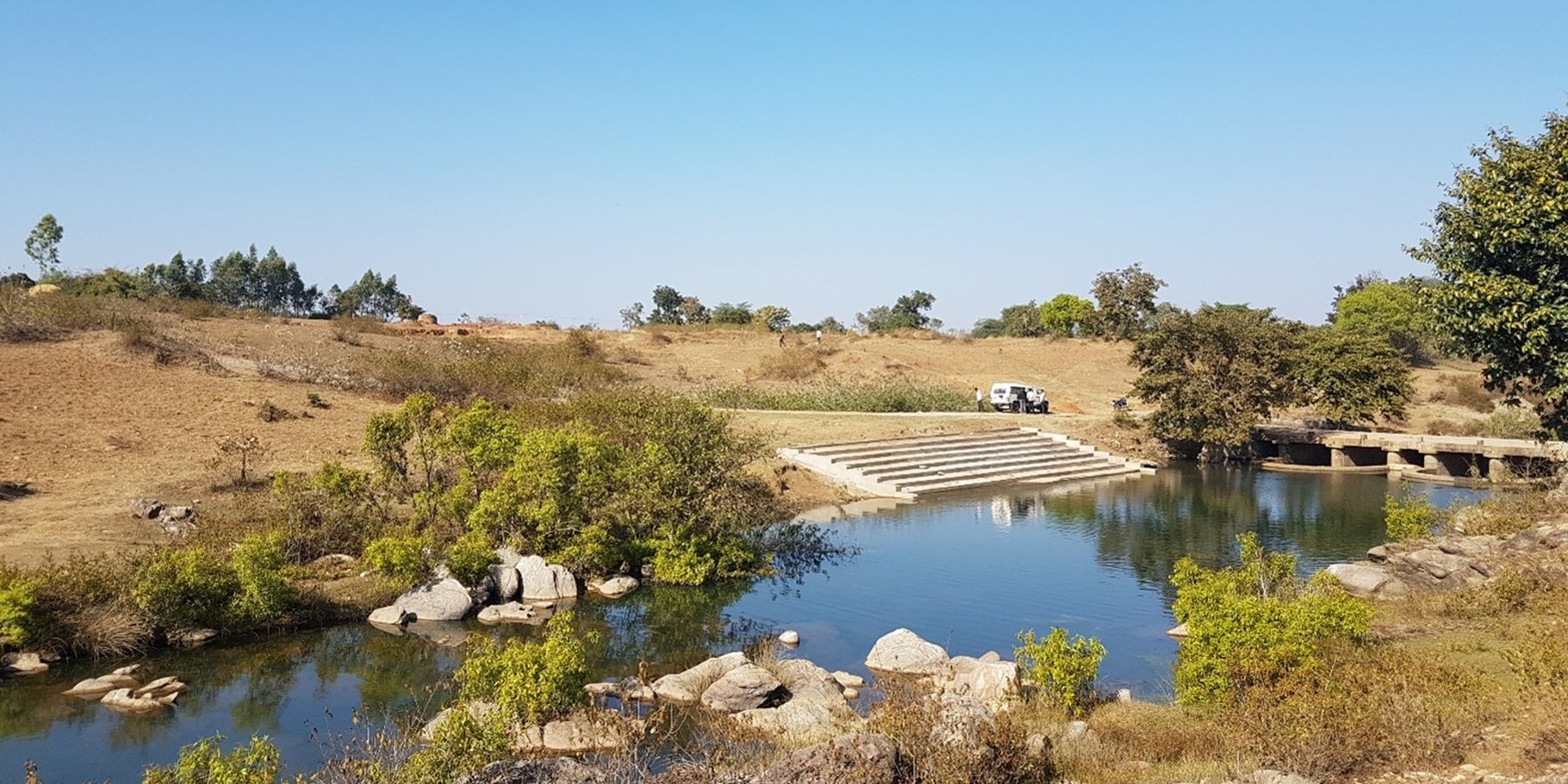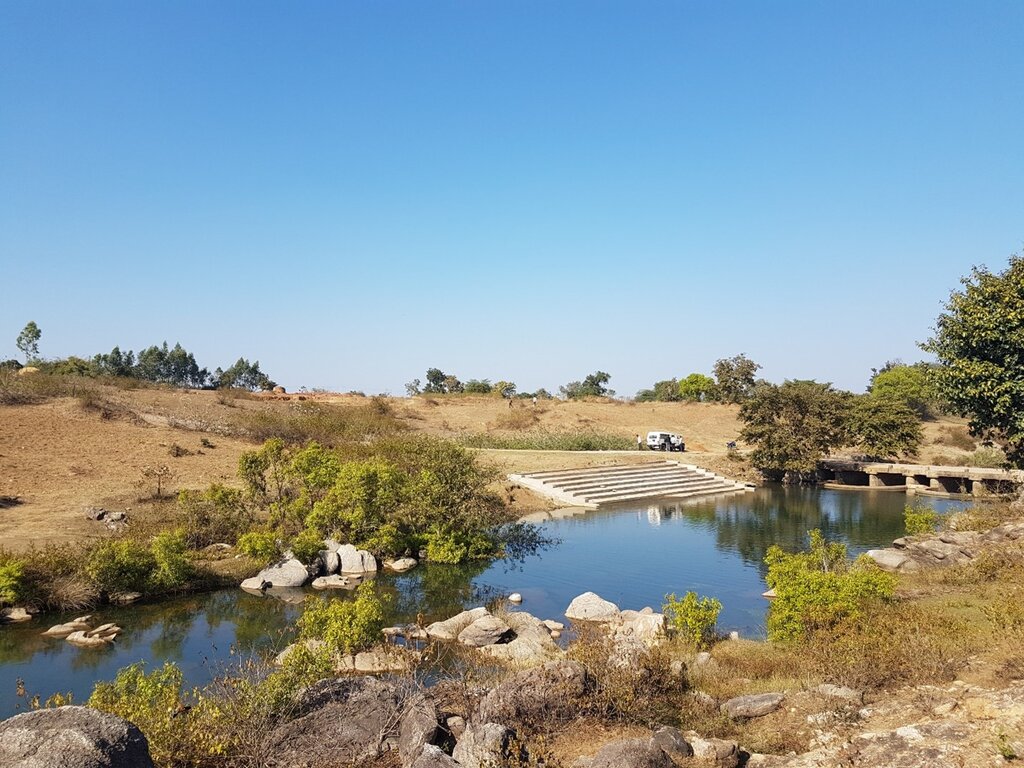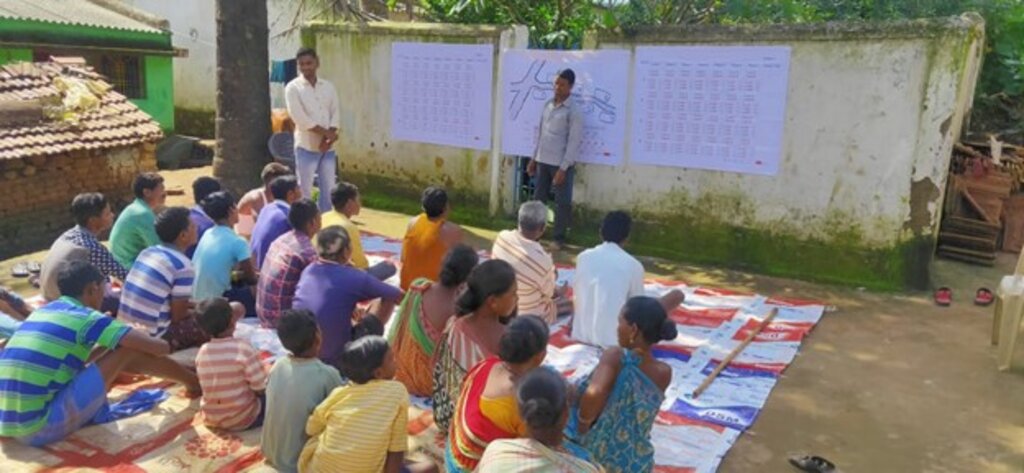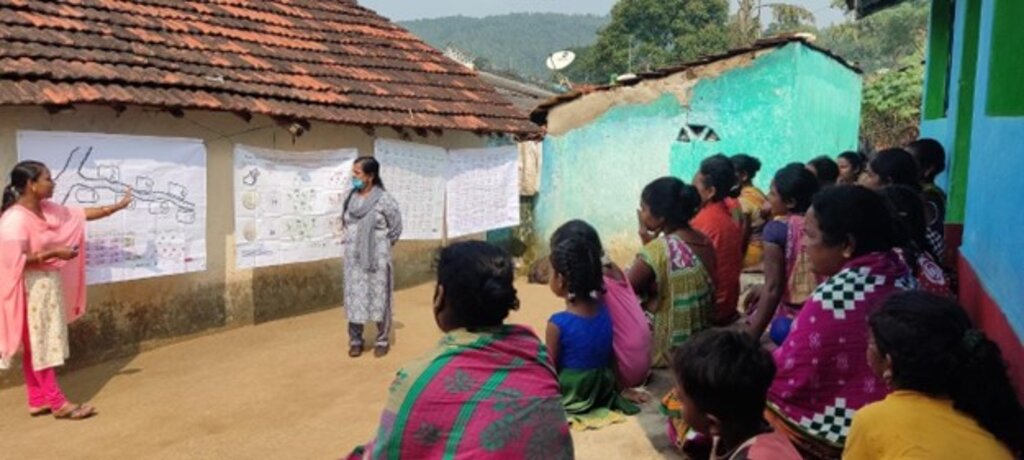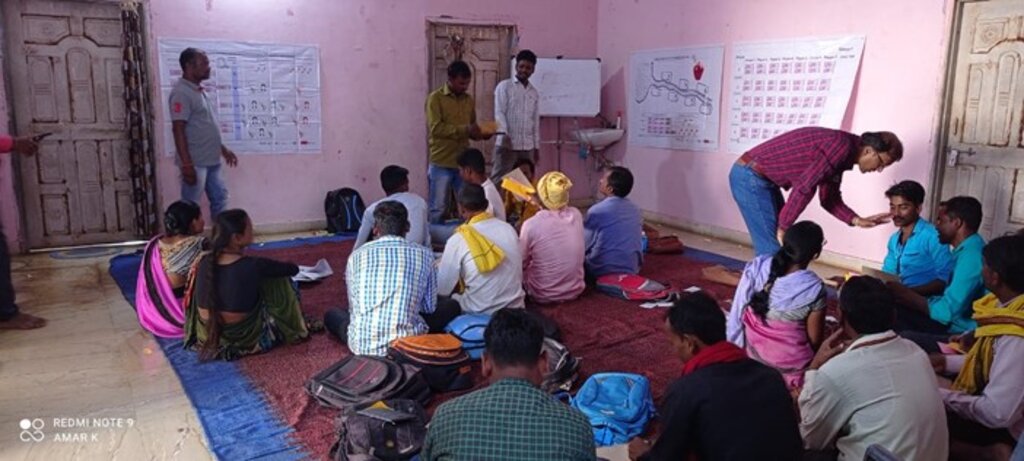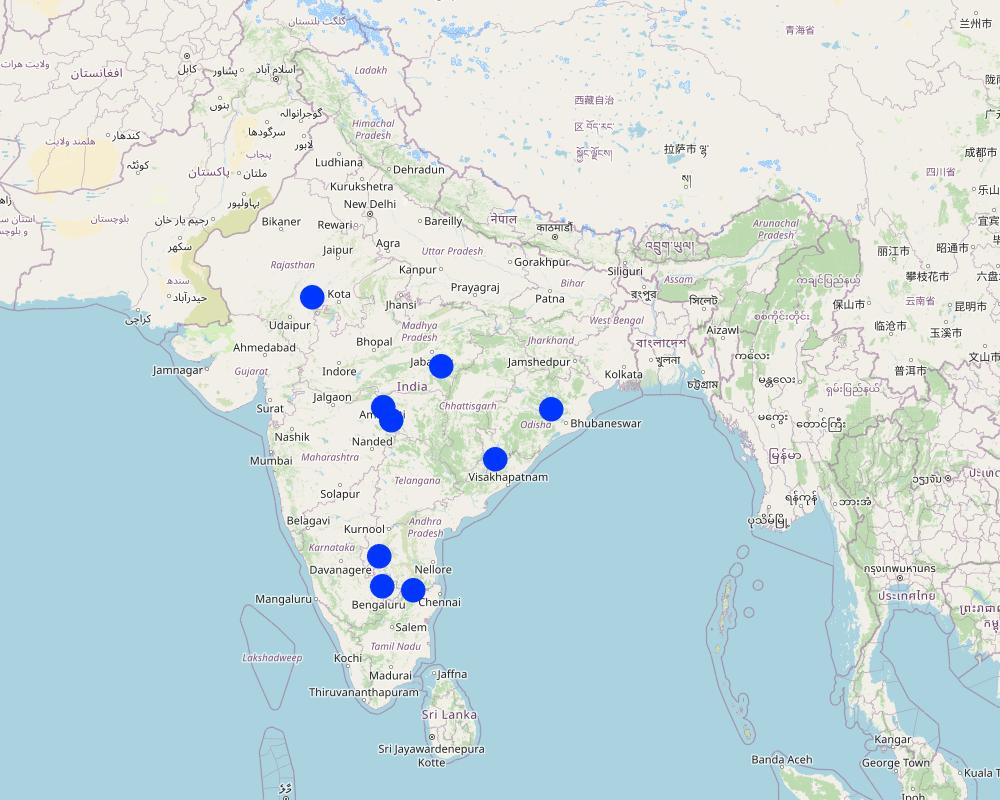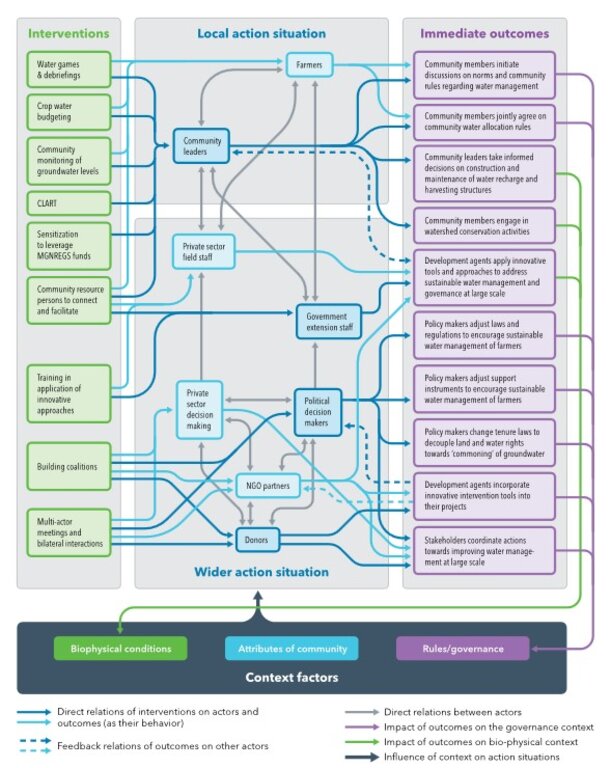Experiential Learning Tools for Sustainable Water Management [Índia]
- Criação:
- Atualização:
- Compilador/a: Vishwambhar Duche
- Editor: –
- Revisores: Udo Höggel, Rima Mekdaschi Studer
Experiential Learning Tools
approaches_7289 - Índia
Veja as seções
Expandir tudo Recolher tudo1. Informação geral
1.2 Detalhes do contato das pessoas capacitadas e instituições envolvidas na avaliação e documentação da abordagem
Especialista em GST:
Especialista em GST:
co-compilador/a:
Sanil Richu
+91 8238065478 / +91 8129719386
richu@fes.org.in
Foundation for Ecological Security (FES)
Anand, Gujrat, India
Índia
co-compilador/a:
Duche Vishwambhar
co-compilador/a:
Hagar ElDidi
+1 202-862-5600
H.Eldidi@cgiar.org
International Food Policy Research Institute (IFPRI)
Washington, D.C., USA
Estados Unidos
co-compilador/a:
Wei Zhang
+1 202-862-5600
W.Zhang@cgiar.org
International Food Policy Research Institute (IFPRI),
Washington, D.C., USA
Estados Unidos
Especialista em GST:
Melesse Mequanint
+254 715093444
Mequanint.Melesse@icrisat.org
International Crops Research Institute for the Semi-Arid Tropics (ICRISAT)
Nairobi, Kenya
Quênia
Nome do projeto que facilitou a documentação/avaliação da Abordagem (se relevante)
Experiential Learning Tools for Sustainable Water Management in India (funded by the German Federal Ministry for Economic Cooperation)Nome do projeto que facilitou a documentação/avaliação da Abordagem (se relevante)
CGIAR support to the Promise of Commons Initiative in India (funded by Co-Impact Philanthropic Funds, Inc)Nome do projeto que facilitou a documentação/avaliação da Abordagem (se relevante)
CGIAR Policy Innovations Science Program (PISP)Nome da(s) instituição(ões) que facilitou(ram) a documentação/avaliação da Abordagem (se relevante)
International Food Policy Research Institute (IFPRI) - Estados UnidosNome da(s) instituição(ões) que facilitou(ram) a documentação/avaliação da Abordagem (se relevante)
Foundation for Ecological Security (FES) - ÍndiaNome da(s) instituição(ões) que facilitou(ram) a documentação/avaliação da Abordagem (se relevante)
International Crops Research Institute for the Semi-Arid Tropics (ICRISAT)1.3 Condições em relação ao uso da informação documentada através de WOCAT
Quando os dados foram compilados (no campo)?
01/10/2021
O/a compilador/a e a(s) pessoa(s) capacitada(s) aceitam as condições relativas ao uso de dados documentados através da WOCAT:
Sim
2. Descrição da abordagem de GST
2.1 Descrição curta da abordagem
The project “Scaling up experiential learning tools for sustainable water governance in India” aimed at enhancing sustainable water management at scale by improving the capacities of 1,500 rural communities covering 105,000 households directly and 2,000 communities covering 140,000 households indirectly in six Indian states to manage water more sustainably. This was achieved through experiential learning from collective action games, structured community debriefings, and participatory water planning tools that contribute to greater awareness and improved governance, inducing behavioural change toward more sustainable water governance and management.
The work was jointly conducted by the Foundation for Ecological Security, India (FES), the International Food Policy Research Institute (IFPRI) and the International Crops Research Institute for the Semi-Arid Tropics (ICRISAT).
2.2 Descrição detalhada da abordagem
Descrição detalhada da abordagem:
The project team adopted a holistic approach to water governance, considering the complex interconnections between water, land, livelihoods, people, and institutions. Rather than viewing groundwater in isolation, the team promoted the conjunctive use of surface and groundwater for irrigation, integrating both supply- and demand-side strategies to water management. Their approach included harnessing data, experiential learning, capacity building, participatory planning, and strategic communication to initiate behavioural change among actors at both community and broader levels.
At the community level, the team focused on shifting behaviour towards sustainable water use by farmers and local communities. They employ tools like the Groundwater Monitoring Tool (GWMT) for collective resource monitoring, experiential learning games and debriefing for social learning, and Crop Water Budgeting (CWB) for participatory water management, sensitization to leveraging funds of the Mahatma Gandhi National Rural Employment Guarantee Scheme (MGNREGS), scientific and participatory planning through the Composite Landscape Assessment and Restoration Tool (CLART). These tools aim at enhancing the understanding of water as a shared resource, at developing the capacity of community resource persons, at fostering collective decision-making, and at encouraging the adoption of water-efficient practices.
Aiming to influence higher-level actors, the project engaged in multi-actor platforms (MAPs) and built coalitions to promote collaborative water governance. These platforms facilitated discussions among various stakeholders, aiming to bridge governance gaps and encourage coordinated actions. The project also provided training to civil society, government, and private sector actors on water governance, equipping them with the knowledge and tools necessary to adopt sustainable practices.
Overall, the project aimed at creating a web of interconnected interventions that influence the behaviour of stakeholders across different levels, ultimately leading to improved water governance and sustainable resource management.
2.3 Fotos da abordagem
Observações gerais sobre as fotos:
Experiential learning tools like the Surface Water Game, the Channel Irrigation Game, the Dam Maintenance Game, and the Groundwater Game played with the farmers who are enjoying benefits of water from common water resources or their private groundwater resources like borewell to irrigate their crops.
2.4 Vídeos da abordagem
Comentários, breve descrição:
Surface Water Game:
Part: 1 This part of the video gives brief introduction, intention of the game, and explain concept of the game.
https://www.youtube.com/watch?v=fpEkeupt_YE
Part: 2 This part of the video explains about the required facilitation team, their roles, facilitation process, material required for the game, and selection of the participants for the game.
https://www.youtube.com/watch?v=SazPe5OHNis
Part-3 This part of the video explains the process of the game, how to take decision from the participants, how to enter players’ decisions into the app, and how to reveal results etc.
https://www.youtube.com/watch?v=aJbyVy4nlIk
Data:
22/03/2021
Localização:
ICRISAT, Hyderabad, Telangana, India
Nome do cinegrafista:
ICRISAT, and KUZA net
Comentários, breve descrição:
Channel Irrigation Game:
Part-1: This part of the video gives brief introduction about the channel irrigation game, intention of the game, and explain concept of the game.
https://www.youtube.com/watch?v=Bw3rCoyKdF0
Part-2: This part of the video explains about the required facilitation team, their roles, facilitation process, material required for the game, and selection of the participants for the game.
https://www.youtube.com/watch?v=Y3aLys5oCBs
Part:3: This part of the video explains the process of the game, how to take decision from the participants, how to enter players’ decisions into the app, and how to reveal results etc.
https://www.youtube.com/watch?v=_-j07Wjily8
Data:
22/03/2021
Localização:
ICRISAT, Hyderabad, Telangana, India
Nome do cinegrafista:
ICRISAT, and KUZA net
Comentários, breve descrição:
Dam Maintenance Game
Part-1: This gives brief introduction about the Dam Maintenance game, intention of the game, and explain concept of the game.
https://www.youtube.com/watch?v=C8S1XURT0nw
Part-2: This part of the video explains about the required facilitation team, their roles, facilitation process, material required for the game, and selection of the participants for the game.
https://www.youtube.com/watch?v=w58A6NDDFRY
Part-3: This part of the video explains the process of the game, how to take decision from the participants, how to enter players’ decisions into the app, and how to reveal results etc.
https://www.youtube.com/watch?v=-LIkHbs1Hyw
Groundwater Game
Part-1: This gives brief introduction about the Groundwater Game, and intention of the game, explain concept of the game.
https://www.youtube.com/watch?v=0MOohqWOeAg
Part-2: This part of the video explains about the required facilitation team, their roles, facilitation process, material required for the game, and selection of the participants for the game.
https://www.youtube.com/watch?v=OpCHch348Kg
Part-3: This part of the video explains the process of the game, how to take decision from the participants, how to enter players’ decisions into the app, and how to reveal results etc.
https://www.youtube.com/watch?v=28ETRZsGv10
Data:
22/03/2021
Localização:
ICRISAT, Hyderabad, Telangana, India
Nome do cinegrafista:
ICRISAT, and KUZA net
2.5 País/região/locais onde a abordagem foi aplicada
País:
Índia
Região/Estado/Província:
Andhra Pradesh, Rajasthan, Karnataka, Odisha, Maharashtra, and Madhya Pradesh States of India
Especificação adicional de localização:
Chittoor and Anantpur District of Andhra Pradesh, Bhilwara district of Rajasthan, Mandala District of Madhya Pradesh, Anugul and Koraput district of Odisha, Chikbalapur district of Karnataka, Yavatmal and Amaravati District of Maharashtra
Map
×2.6 Datas de início e término da abordagem
Indique o ano de início:
2013
2.7 Tipo de abordagem
- Baseado em projeto/programa
2.8 Principais metas/objetivos da abordagem
The approach shall support sustainable land management practices that reduce the proportion of land that is degraded. This contributes to improved food security and strengthens resilience and adaptive capacity of communities through improved water management and irrigation. The approach embeds the ambition to empower women and marginalized groups in their contributions to agriculture and society in general.
These impact ambitions shall be achieved through behavioural changes in three domains:
1. Water supply side provisioning actions (mainly investments in and maintenance of minor water harvesting structures, such as dams, tanks, or small check dams).
2. Institutional service provision actions (mainly participatory formulation and enforcement of local by-laws on water management).
3. Water appropriation actions (mainly the use of water efficient agricultural technologies, esp. the consideration of crop water requirement in crop choices).
The outcomes of the interventions are seen in the light of needs and capacities of marginalized groups, esp. women and youth. The behavioural changes shall be achieved by influencing the system understanding and norms using the systemic experiential learning approach outlined above.
2.9 Condição que propiciam ou inibem a implementação de tecnologia/tecnologias aplicada(s) segundo a abordagem
Normas e valores sociais/culturais/religiosos
- Propício
1. Legal quota for women representation in local government bodies.
2. Inclusion of women farmers who are involved in selection of crops at household level and in decisions on the maintenance of common water infrastructures.
- Inibitivo
Depending on the state, social norms prevent women to freely speak in the presence of men.
Quadro institucional
- Propício
The Mahatma Gandhi National Rural Employment Guarantee Scheme (MGNREGS) can be leveraged to support sustainable water management.
- Inibitivo
1. Subsidies (especially on energy) and other support mechanisms discourage sustainable water management.
2. Changing rules about water use sometimes requires longer time for deliberation and policy making.
Colaboração/coordenção de atores
- Propício
A cross-sectoral alliance called “The Promisse of Commons” creates a strong movement also with regards to sustainable water management.
- Inibitivo
Multiple stakeholders often act in their own silos.
Quadro jurídico (posse de terra, direitos de uso da terra e da água)
- Propício
Recent revisions of Government support mechanisms such as minimal support prices also include water efficient crops.
- Inibitivo
Water rights are connected to land rights creating the widespread perception that water underneath ones land can be used without restrictions.
Políticas
- Propício
1. Diverse Central Government and State level policies, guidelines and regulations support participatory and sustainable watershed management.
2. Policies that favour participatory management of water resources and focus on behaviour change such as Atal Bhujal Yojana.
3. Policies that support zoning of rice production based on water tables.
- Inibitivo
1. Policies that give price guarantees by way of a minimum support price for farmers for growing water intensive crops.
2. Energy subsidies encourage intensive groundwater pumping.
Conhecimento sobre GST, acesso a suporte técnico
- Propício
Watershed interventions have a long history in India and there is widespread knowledge about sustainable soil-water management practices
- Inibitivo
Most implementing organizations including the government focus on supply side water management interventions.
Mercados (para comprar entradas, vender produtos) e preços
- Propício
Supporting development of market opportunities for less-water consumptive crops and their products.
- Inibitivo
1. Consumer preferences favor water intensive commodities.
2. Rising salary level for farm labor
Carga de trabalho, disponibilidade de força de trabalho
- Propício
The Mahatma Gandhi National Rural Employment Guarantee Scheme (MGNREGS) also supports work of local communities on soil-water management.
- Inibitivo
Low labor requirements of flood-irrigated rice production make many farmers prefer this water-consumptive cropping system compared to more water-efficient production systems.
3. Participação e papel das partes interessadas envolvidas
3.1 Partes interessadas envolvidas na abordagem e seus papéis
- Usuários de terra/comunidades locais
Farmers who are using common or private water resources for cultivation of post rainy-season crops.
Building the capacity of water resource (Private or common) user.
- Organizações comunitárias
1. Foundation for Ecological Security (FES)
2. Water User Associations
3. Farmers groups
4. Women self-help groups
5. Pasture land development committees
6. SLM specialists / agricultural advisors
7. Sanjeevani Institute for Empowerment and Development (SIED)
8. PRADAN
9. VIKSAT
10. Reliance Foundation
11. Swadesh Foundation
Building the capacity of water resource (Private or common) user
- Especialistas em GST/ consultor agrícola
IFPRI (https://www.ifpri.org)
ICRISAT (https://www.icrisat.org)
FES (https://fes.org.in)
Technical support to the design of the approach
- Setor privado
Cotton Connect (https://www.cottonconnect.org/)
Cotton Connect provide farmers with the training, education and tools they need to improve their productivity, income and profitability.
- Organização internacional
1. International Food Policy Research Institute, IFPRI
2. International Crops Research Institute for the Semi-Arid Tropics, ICRISAT
Supporting with agricultural and food policy research
- Government Partners
1. Atal Bhujal Yojana National Program Management Unit (NPMU),
2. Odisha Agriculture Department & Odisha Livelihoods Mission
The goal of Atal Bhujal Yojana (Atal Jal) is to demonstrate community-led sustainable groundwater management which can be taken to scale. The major objective of the scheme is to improve the management of groundwater resources in selected water-stressed areas and states.
Odisha Livelihood Mission has put in place a dedicated and sensitive support structure, to take the rural poor households out of poverty line trough capacity building, financial assistance and self-reliant institutions.
Caso várias partes interessadas foram envolvidas, indique a agência líder:
Foundation for Ecological Security (Pratiti Priyadarshini)
3.2 Envolvimento do usuários de terra/comunidades locais nas diferentes fases da abordagem
| Envolvimento do usuários de terra/comunidades locais | Especifique quem estava envolvido e descreva as atividades | |
|---|---|---|
| Iniciação/motivação | Passivo | The Foundation for Ecological Security (FES) has local presence in the Districts targeted with direct interventions. The NGO expressed the need for advancing their toolbox through established and trustful relations to local communities, FES consulted communities regarding their main water management challenges. The results of these consultations formed the basis for the design of the intervention strategy and the development of the approach. Specific communities were selected based on their interest in improving water management and the severeness of water management challenges they face. Within the villages, especially households living close to water resources and enjoying benefit from the water resources and farmers who own private groundwater pumps were invited to participate in activities. |
| Planejamento | Passivo | The planning of the implementation of interventions was mainly done by the project partners, most importantly the Foundation for Ecological Security. FES trained local community members to become Community Resource Person (CRP). CRPs organize the implementation of specific interventions in interaction with community members. |
| Implementação | Automobilização | Community members actively participated in experiential learning games, participatory crop water budgeting, the participatory planning of water infrastructure investments using CLART, focus group discussions, debriefings and bilateral interactions. |
| Monitoramento/avaliação | Participativo | After the interventions, CRPs work closely with the communities and, if needed, FES helps community members to formulate or revise water rules and by-laws. Community members monitor the water table of their wells. |
3.3 Fluxograma (se disponível)
Descrição:
Interconnections between actors and interventions
Autor:
Sanil, Falk, Meinzen-Dick, Priyadarshini (2024)
3.4 Decisão sobre a seleção de tecnologia/tecnologias de GST
Especifique quem decidiu sobre a seleção de tecnologia/tecnologias a serem implementadas:
- Somente especialistas em GST
Explique:
With the help of a set of questions, the decision tree for water governance games will advise CRPs and other facilitators in applying specific experiential learning tools fitting to the specific situation at site. The tool examines which challenges are present and identifies interventions to address those challenges. After checking whether water scarcity is an issue, CRPs ask local key informants such as community leaders, committee members or elders whether the community is primarily using surface water from channels or large dams. If the community is not connected to a channel or large dam irrigation system, they assess whether wells frequently run dry and need to be deepened, and whether groundwater is intensively used for irrigation. If this is the case, they check whether there are alternative management practices, like more water-efficient crop choices that could improve group outcomes. Finally, they ask whether there are already local rules dealing with this situation. Similar sequences of questions were used to ask about the collective maintenance of water harvesting structures, and allocation of surface water from structures such as small ponds or “tanks”. This process ends with a recommendation of which group of tools are best suited for the context, including which game would resonate best with community challenges (Channel irrigation game, Groundwater game, or Surface water game), and what related decision support tools the communities may benefit from, such as Crop-Water Budgeting (CWB) and the Composite Landscape Assessment and Restoration Tool (CLART).
- •Experience of CRPs and local key informants; Lessons and highlights emerging from diagnostic and consultation processes
4. Suporte técnico, reforço das capacidades e gestão do conhecimento
4.1 Reforço das capacidades/ formação
Foi oferecida formação aos usuários da terra/outras partes interessadas?
Sim
Especifique quem foi capacitado:
- Equipe de campo/consultores
- Government officials, community members
Caso seja relevante, especifique gênero, idade, status, etnia, etc.
1. More than 500 government staff of Atal Bhujal Yojana Program.
2. More than 400 government extension workers of Odisha Livelihood Program.
3. More than 3000 additional government extension officers and field staff were trained in applying the experiential learning tools.
4. 1.086 local community members were trained in applying the experiential learning tools.
5. More than 52.000 community members participated in more than 5200 experiential learning sessions.
6. Senior Government officials were introduced to the approach in order to create their buy-in.
Tipo de formação:
- Agricultor para agricultor
- Áreas de demonstração
Assuntos abordados:
1. Conceptual background of the approach
2. Demonstrations
3. Teaching the facilitation steps of the different tools
4. Exercising among the trainees and supervised implementation with community members.
5. Experiential learning games, crop water budgeting, CLART, and debriefings.
4.2 Serviço de consultoria
Os usuários de terra têm acesso a um serviço de consultoria?
Sim
- Private and civil society actors
Descreva/comentários:
Government, private sector and civil society actors provide advisory services. The whole approach of the project is based on the idea of social learning where participants find own solutions based on gaining a better understanding of and activating social norms related to the hydrological system, the management challenge, associated social dilemmas, and possible solutions. This approach is very distinct from a typical one-directional advisory service.
4.3 Fortalecimento da instituição (desenvolvimento organizacional)
As instituições foram fortalecidas ou estabelecidas através da abordagem?
- Sim, significativamente
Especifique a que nível (níveis) as instituições foram fortalecidas ou estabelecidas:
- Local
- Regional
- Nacional
Descreva instituição, papéis e responsabilidades, membros, etc.
The approach has a clear intention to strengthen local water governance. In pilot studies, we found that communities who participated in experiential learning games were more likely to adopt water registries as a water planning method.
Especifique o tipo de apoio:
- Reforço das capacidades/ formação
4.4 Monitoramento e avaliação
Monitoramento e avaliação são partes da abordagem?
Não
Comentários:
FES monitors progress of activities and outputs through contextualized key performance indicators and evaluated progress towards outcomes through reviews and workshops. In addition, the partners conducted a multi-method impact assessment including a rigorous quantitative comparison of 314 randomly selected treatment sites with 158 control sites with regards to effects on:
1. System understanding
2. Injunctive norms for sustainable water management
3. Women community members’ involvement in water-related decision-making
4. Investments in formulating water management rules as an institutional service provision
5. Enforcement of water management rules as an institutional service provision
6. Investments in water harvesting structures as a resource provisioning activity or leverage public funding's such as MGNREGS for the purpose
7. Conditions of water-related infrastructure
8. Crop choices with lower water consumption levels, resulting in irrigated water savings
4.5 Pesquisa
A pesquisa foi parte da abordagem?
Sim
Especifique os tópicos:
- Sociologia
- Economia/Marketing
- Ecologia
Dê mais detalhes e indique quem realizou a pesquisa:
In addition to the aforementioned impact assessment, we conducted research to conceptualize behavioural change mechanisms associated with experiential learning. We also synthesized lessons learned with regards to design features of tools, assessed effects of women’s participation, and developed a theory of system-level change to guide implementations and inform future programs in the area.
5. Financiamento e apoio material externo
5.1 Orçamento anual para o componente de GST da abordagem
Caso o orçamento exato seja desconhecido, indique a faixa:
- < 2.000
Comentários (p. ex. principais fontes de recursos/principais doadores):
The described approach has been implemented in multiple stages with different funding sources. Training 1.086 local community members in applying the experiential learning tools and conducting experiential learning sessions with 12.000 community members participated in more than 1.200 experiential learning sessions was implemented with a budget of 1.2 Mio Euro.
According to our estimates, conducting one experiential learning session at one site costs between 70 and 120 USD depending on accessibility and the need for facilitation of other stakeholders. This includes the time of facilitators, transport, materials and initial training.
5.2 Apoio financeiro/material concedido aos usuários da terra
Os usuários da terra receberam apoio financeiro/material para a implementação de tecnologia/tecnologias?
Não
5.3 Subsídios para entradas específicas (incluindo mão-de-obra)
- Nenhum
5.4 Crédito
Foi concedido crédito segundo a abordagem para atividades de GST?
Não
5.5 Outros incentivos ou instrumentos
Foram utilizados outros incentivos ou instrumentos para promover a implementação das tecnologias de GST?
Não
6. Análise de impactos e declarações finais
6.1 Impactos da abordagem
A abordagem concedeu autonomia aos usuários locais de terra, melhorou a participação das partes interessadas?
- Não
- Sim, pouco
- Sim, moderadamente
- Sim, significativamente
Community members voluntarily participated in the experiential learning sessions. It brought together different stakeholders at the village level and initiated discussion around water management.
A abordagem auxiliou os usuários da terra a implementar e manter as tecnologias de GST?
- Não
- Sim, pouco
- Sim, moderadamente
- Sim, significativamente
In a study in Madhya Pradesh in 2018, we found evidence that two years after the intervention, key informants of communities who participated in experiential learning sessions reported with an approximately 20 percent higher probability that maintenance activities of common local water harvesting structures had taken place. An impact assessment, comparing 314 randomly selected treatment sites with 158 control sites confirmed that participants in interventions made stronger efforts to maintain local water harvesting structures and, if cultivating crops in the post-rainy season, reduce the size of the cultivated area.
A abordagem melhorou a coordenação e a implementação economicamente eficiente da GST?
- Não
- Sim, pouco
- Sim, moderadamente
- Sim, significativamente
The approach brought together different stakeholders from the village to the central government level and initiated discussion around water management.
A abordagem aprimorou o conhecimento e as capacidades dos usuários da terra para implementar a GST?
- Não
- Sim, pouco
- Sim, moderadamente
- Sim, significativamente
More than 52.000 community members participated in more than 5200 experiential learning sessions. The participatory crop-water budgeting and common water infrastructure planning exercises provided communities with additional information towards better informed decisions. In an impact assessment, comparing 314 randomly selected treatment sites with 158 control sites we did not find that water related system-understanding improved in the dimensions assessed. Given that we observed behavioural changes and a high level of system understanding during the baseline assessment, we hypothesize that knowledge was either not the constraining factor or that our assessment did not capture the most relevant knowledge dimensions being affected by the intervention.
A abordagem concedeu autonomia aos grupos social e economicamente desfavorecidos?
- Não
- Sim, pouco
- Sim, moderadamente
- Sim, significativamente
•We have implemented the experiential learning tools in areas having small and marginal farmers and marginalized communities, such as Scheduled Casts and Scheduled Tribes. •An impact assessment, comparing 314 randomly selected treatment sites with 158 control sites found that women reported, after participating in experiential learning sessions, a greater likelihood of their participation in agricultural decision processes.
A abordagem melhorou a igualdade de gêneros e concedeu autonomia a mulheres e meninas?
- Não
- Sim, pouco
- Sim, moderadamente
- Sim, significativamente
An impact assessment, comparing 314 randomly selected treatment sites with 158 control sites found that women reported, after participating in experiential learning sessions, a greater likelihood of their participation in agricultural decision processes.
A abordagem resultou em segurança alimentar aprimorada/nutrição melhorada?
- Não
- Sim, pouco
- Sim, moderadamente
- Sim, significativamente
We have no related evidence but assume that improved maintenance of common water infrastructure improved post-rainy season water supply including for irrigation and food production. The approach intended to trigger a shift of farmers to more water efficient crops. In our impact assessment, we do not find a significant change towards water efficient crops. Given that in our project region, water is the main constraining production factor, a shift towards water efficient crops would simultaneously improve sustainable water management and food production. We find, however, that farmers who participated in the interventions reduced the cultivated area in the post-rainy season. While this contributes to more sustainable water management and long-term food production, it may create unintended trade-offs with short-term food production. The partners continue refining the approach to address this effect.
A abordagem aprimorou a capacidade dos usuários da terra de adaptar-se a mudanças climáticas/extremos e atenuar os desastres relacionados com o clima?
- Não
- Sim, pouco
- Sim, moderadamente
- Sim, significativamente
Sustainable water management including water harvesting strongly contributes to communities’ capacities to cope with climate change which increases the frequency of extreme events such as high rainfall events, droughts, and dry spells.
6.2 Principal motivação dos usuários da terra para implementar a GST
6.3 Atividades de sustentabilidade de abordagem
Os usuários da terra podem manter o que foi implementado através da abordagem (sem apoio externo)?
- Sim
Caso afirmativo, descreva como:
The actual SLM activities (especially maintaining water harvesting structures and growing water-efficient crops) are not done by the project but the community members themselves. The presented approach creates the space for communities to find their own solutions to water management challenges. Such solutions are with a higher likelihood tailored to the local context. The partners further assume that communities develop a strong sense of ownership to their solutions which creates motivation to implement them. Rules formulated by the communities may require less external enforcement as they are followed based on intrinsic motivations. The partners acknowledge possible constraints in terms of labour and materials. For this reason, the Foundation for Ecological Security supports communities to effectively leverage government funds. Most notable is the Mahatma Gandhi National Rural Employment Guarantee Scheme (MGNREGS) as a permanent large-scale government program with dual focus on improving rural livelihoods through creation of durable assets and strengthening local governance. MGNREGS allows communities to demand financial support for investments in construction and maintenance of natural resource management assets on public and individual lands.
6.4 Pontos fortes/vantagens da abordagem
| Pontos fortes/vantagens/oportunidades na visão do usuário da terra |
|---|
| Please see Section 6.2. In general, the approach helps community members to initiate discussion on water issues. The games help in reinforcing the idea of water as a common good. Most elements of the toolbox bring together different stakeholders from the village to the district level and facilitate collective social learning. The debriefing sessions also allow discussion, deliberation, and relating game outcomes and learnings to their real-life challenges and solutions. The crop water budgeting helps in planning which crops to grow collectively after assessing the water situation. It offers space for all community members to deliberate on crop choice and consider various aspects before deciding on certain crops. |
| Pontos fortes/vantagens/oportunidades na visão do/a compilador/a ou de outra pessoa capacitada |
|---|
| There is growing recognition of the potential of experiential learning, which by definition includes experiencing, reflecting, and experimenting to support communities in finding own solutions. The approach contrasts with more formal presentations of abstract knowledge that are common in many forms of teaching, or costly learning by doing in real-life. For instance, games create a relatively low-risk forum for experiencing and discussing the complexities of social-ecological systems and allow for exploring behaviour that is too risky in real-life. This can lead directly into inventing and negotiating own rules, including enforcement mechanisms. Players can experiment with rule making and can take this experience into the interaction with the wider community. As the exercise can trigger constructive interaction of resource users and other stakeholders, the resulting social learning effect can potentially go beyond the specific issue or framing of the game to supporting the development of institutional capacity for sustainable commons management. As experiential learning supports participants in finding own solutions, these solutions are likely to be better adapted to the specific social-ecological systems and, therefore more accepted. This increases the likelihood of behavioural change. |
| The main advantage of the approach is its clear structure which makes it relatively easy to learn and replicate it at large scale. The cooperation with government partners confirms the strong demand for replicable and scalable behavioural change tools in the context of water management. |
6.5 Pontos fracos, desvantagens da tecnologia e formas de superá-los
| Pontos fracos/desvantagens/riscos na visão do usuário da terra | Como eles podem ser superados? |
|---|---|
| Community members need to mobilize own resources and may feel overtrained in implementing own solutions. | Local level partners and government can assist in supporting communities in the process of implementing solutions. Linking communities to permanent support structures such as the Mahatma Gandhi National Rural Employment Guarantee Scheme (MGNREGS) may be essential. |
| Improving sustainable water use can create short-term trade-offs with food production. | The approach intends to support solutions which do not create long-term trade-offs with food production. Facilitators can create awareness for such trade-offs. Learning tools can make such trade-offs more explicit and identifyable. |
| Swelling but hidden conflicts related to resource distribution and free-riding behaviour may break open. | It is important to note that the approach would not create conflict but only make conflicts visible. The games allow to discuss behaviour which is the source of conflict in a setting where it can be played in a symbolic way without pointing at any specific person. Firmly embedded community organisations such as the panchayat having a mandate to coordinate community issues is essential. Facilitators should be sensitized for signs of open conflicts and act sensitively. If necessary, they can support finding an adequate moderator. |
| Pontos fracos/vantagens/riscos na visão do/a compilador/a ou de outra pessoa capacitada | Como eles podem ser superados? |
|---|---|
| Facilitators use inappropriate tools leading to inappropriate solutions. | Decision support tools were developed to guide facilitators appropriately. Taking the approach to new geographies requires a good idea of the management challenges. There may be need to adapt tools to new contexts. |
| Facilitators are impatient and fall back into a teaching mode. | Emphasizing the value of experiential learning and creating trust in the creative potential of communities needs to be a priority in facilitator trainings. |
| Communities think only within the space of existing knowledge | The approach can be combined with the sharing information on innovative technologies. |
| Policy and market dynamics override local level initiatives | Local level experiential learning needs to be embedded into a system level multi-stakeholder process. For instance, in our case, government officials needed to be aware of the problematic incentives created by energy subsidies, current minimal support price mechanisms and other farmer support systems. Building coalitions, multi-actor platforms and bilateral interactions need to part of the intervention strategy. |
| Unintended gender dynamics may appear | Great care needs to be taken on decisions such as whether to conduct mixed-sex sessions or sessions with women only. A good understanding and consideration of specific dynamics is essential. |
| A once-off intervention may be too weak to create a lasting effect. | If this is observed, the experiential learning interventions should be repeated. Important is to apply the combination of tools not only because they build on each other but also to sustained interaction with the community. |
| In the presence of elite groups, members of marginalized groups will not interact | The facilitator can navigate the discussion so that all groups are adequately represented. The facilitators are to be trained so to be more sensitive in the facilitation. If this is insufficient to ensure equal participation, conducting separate sessions with marginalised groups may be required, at least as a preparatory step. |
7. Referências e links
7.1 Métodos/fontes de informação
7.2 Referências às publicações disponíveis
Título, autor, ano, ISBN:
Meinzen-Dick, R., Chaturvedi, R., Domènech, L., Ghate, R., Janssen, M. A., Rollins, N. D., & Sandeep, K. (2016). Games for groundwater governance: Field experiments in Andhra Pradesh, India. Ecology and Society, 21(3).
Disponível de onde? Custos?
India. Ecology and Society
Título, autor, ano, ISBN:
Meinzen-Dick, R., Janssen, M. A., Kandikuppa, S., Chaturvedi, R., Rao, K., & Theis, S. (2018). Playing games to save water: Collective action games for groundwater management in Andhra Pradesh, India. World Development, 107, 40-53.
Disponível de onde? Custos?
World Development
Título, autor, ano, ISBN:
Falk, T., Kumar, S., & Srigiri, S. (2019). Experimental games for developing institutional capacity to manage common water infrastructure in India. Agricultural Water Management, 221, 260-269.
Disponível de onde? Custos?
Agricultural Water Management
Título, autor, ano, ISBN:
Falk, T., V. Duche, Suhas K.S., I. Agrawal, and L. Bartels. 2020. The Role of Community Institutions in the Management of Water Infrastructure in the Context of Madhya Pradesh, India. J. Indian Water Resourc. Soc. 40 (3&4): 36-46
Disponível de onde? Custos?
Journal of Indian Water Resource Society
Título, autor, ano, ISBN:
Falk, T., Zhang, W., Meinzen-Dick, R., & Bartels, L. (2021). Using Games to Trigger Collective Changes in Natural Resource Management: Conceptual Foundations for Behavioral Change. IFPRI Discussion Paper 02233. Washington DC/USA
Disponível de onde? Custos?
IFPRI Discussion Paper
Título, autor, ano, ISBN:
Falk, T., Schüpf, D., Zhang, W., Soliev, I. (2021). A behavioral perspective on improving water governance in India. IFPRI blog
Disponível de onde? Custos?
https://www.ifpri.org/blog/behavioral-perspective-improving-water-governance-india
Título, autor, ano, ISBN:
Falk, T., Schüpf, D., Zhang, W., Soliev, I. (2021) Understanding behavioral change for improved water governance: Reflecting on ongoing development interventions in India. Blog published at the European website of the International Association for the Study of the Commons
Disponível de onde? Custos?
https://europe.iasc-commons.org/behavioral-change-improved-water-governance-india/
Título, autor, ano, ISBN:
Foundation for Ecological Security, International Crops Research Institute for the Semi-Arid Tropics, and International Food Policy Research Institute. 2021. Commoning the Commons: A Sourcebook to Strengthen Management and Governance of Water as Commons
Disponível de onde? Custos?
https://fes.org.in/resources/sourcebooks,manuals,atlases-&-ecoprofiles/sourcebooks/strengthening_governance_and_management_of_water_as_commons_May_2022.pdf
Título, autor, ano, ISBN:
Bartels, L., Falk, T., Duche, V., & Vollan, B. (2022). Experimental games in transdisciplinary research: The potential importance of individual payments. Journal of Environmental Economics and Management, 113, 102631.
Disponível de onde? Custos?
Journal of Environmental Economics and Management
Título, autor, ano, ISBN:
Falk, T., Zhang, W., Meinzen-Dick, R. S., & Bartels, L., Sanil, R., Priyadarshini, P. (2023) Games for Social Learning: Triggering Collective Changes in Commons Management. Ecology and Society.
Disponível de onde? Custos?
Ecology and Society
Título, autor, ano, ISBN:
Janssen, M. A., Falk, T., Meinzen-Dick, R., & Vollan, B. (2023). Using games for social learning to promote self-governance. Current Opinion in Environmental Sustainability, 62, 101289.
Disponível de onde? Custos?
Current Opinion in Environmental Sustainability
Título, autor, ano, ISBN:
Falk, T., Zhang, W., Meinzen-Dick, R., Sanil, R., Priyadarshini, P. (2023) Changing the game: Experiential learning for triggering large scale change towards sustainable water management in India. IFPRI blog.
Disponível de onde? Custos?
https://www.ifpri.org/blog/changing-game-experiential-learning-triggering-large-scale-change-towards-sustainable-water
Título, autor, ano, ISBN:
Meinzen-Dick, R., & Bruns, B. (2024). Crafting Combinations to Govern Groundwater: Knowledge, Motivation, and Agency. International Journal of the Commons, 18(1).
Disponível de onde? Custos?
International Journal of the Commons
Título, autor, ano, ISBN:
Sanil, R., Falk, T., Meinzen-Dick, R., & Priyadarshini, P. (2024). Combining Approaches for Systemic Behaviour Change in Groundwater Governance. International Journal of the Commons, 18(1), 411-424.
Disponível de onde? Custos?
International Journal of the Commons
Título, autor, ano, ISBN:
ElDidi, H., Rawat, S., Meinzen-Dick, R., Chaturvedi, R., & Sanil, R. (2024). Polycentric governance of commons through multi-stakeholder platforms: insights from two case studies in India. Environment, Development and Sustainability, 1-27.
Disponível de onde? Custos?
Environment, Development and Sustainability
Título, autor, ano, ISBN:
Falk, T., Duche, V., Sanil, R., Priyadarshini, P., ElDidi, H., Meinzen-Dick, R., Bruns, B. (2024) Playing the right game: A decision tree for choosing approaches to strengthen water governance. IFPRI blog
Disponível de onde? Custos?
https://www.ifpri.org/blog/playing-right-game-decision-tree-choosing-approaches-strengthen-water-governance
7.3 Links para informação relevante que está disponível online
Título/ descrição:
Scaling up experiential learning tools for sustainable water governance in India
URL:
https://www.ifpri.org/project/scaling-experiential-learning-tools-sustainable-water-governance-india
Título/ descrição:
Sourcebook
URL:
https://fes.org.in/resources/sourcebooks,manuals,atlases-&-ecoprofiles/sourcebooks/strengthening_governance_and_management_of_water_as_commons_May_2022.pdf
Título/ descrição:
Crop Water Budgeting (CWB)
URL:
https://www.indiaobservatory.org.in/tool/cwb
Título/ descrição:
Groundwater Monitoring Tool (GWMT)
URL:
https://wmt.indiaobservatory.org.in/dashboard/map-dashboard
Título/ descrição:
Composite Landscape Assessment and Restoration Tool (CLART)
URL:
https://www.indiaobservatory.org.in/tool/clart-det
Título/ descrição:
Surface Water Game Manual
URL:
https://gamesforsustainability.org/practitioners/#surface-water-game
Título/ descrição:
Channel Irrigation Game
URL:
https://gamesforsustainability.org/practitioners/#chanel-irrigation-game
Título/ descrição:
Dam Maintenance Game
URL:
https://gamesforsustainability.org/practitioners/#game-on-managing-check-dams
Título/ descrição:
Groundwater Game
URL:
https://gamesforsustainability.org/practitioners/#groundwater-game
Links e módulos
Expandir tudo Recolher tudoLinks
Não há links
Módulos
Não há módulos


